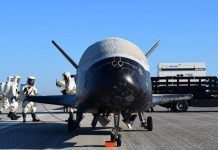
Elon Musk, the founder of SpaceX and Tesla and co-head of the new Department of Government Efficiency advising President-elect Donald Trump, has once again voiced his criticism of the F-35 stealth fighter, advocating for unmanned drones as the future of aerial warfare.
On Sunday, Musk shared a video of synchronized drone swarms performing intricate maneuvers on his social media platform, X. He commented, “Meanwhile, some idiots are still building manned fighter jets like the F-35.”
This marks another instance of Musk questioning the ongoing reliance on manned fighter jets. In 2020, he declared that the era of traditional fighter jets was coming to a close, suggesting that the F-35 should be challenged by unmanned aerial vehicles (UAVs). Musk reinforced this stance when responding to a user who called drones “the new level of warfare,” replying with a “100” emoji.
Asked about competition in military aircraft, Musk emphasized the importance of competition, stating, “Competition is a good thing. It may seem at times that we should focus on one system rather than divide resources, but, in my opinion, the Joint Strike Fighter should have a competitor… It’s not ideal to rely on a single provider; having meaningful competition is crucial.”
In an exchange with Aviation Week’s Lee Hudson, Musk elaborated on the type of competitor he envisioned for the F-35. He proposed a drone fighter plane that would be remotely controlled by humans but enhanced with autonomous maneuvers. “The F-35 would stand no chance against it,” he asserted.
Musk’s renewed critique of the F-35 comes amid an escalating debate about the future of air combat. The F-35, developed by Lockheed Martin, has faced significant criticism over delays, budget overruns, and concerns about its combat capabilities, yet it remains a core component of the U.S. and allied air forces.
Musk’s support for drone-based warfare aligns with a growing shift within the military towards unmanned systems. These systems are seen as a way to improve operational efficiency while reducing risks to pilots. The vision of remote-controlled drones with AI-driven autonomy represents a departure from traditional manned aircraft.
Though Musk’s comments continue to spark discussion, they reflect a broader trend that unmanned and autonomous technologies will increasingly shape the future of military operations. His assertion that the F-35 would be outclassed by a well-developed drone competitor highlights the transformative potential of emerging technologies in warfare.
Despite the criticisms, the F-35 remains a central element of many allied nations’ air forces, including the U.S., U.K., and Japan.





